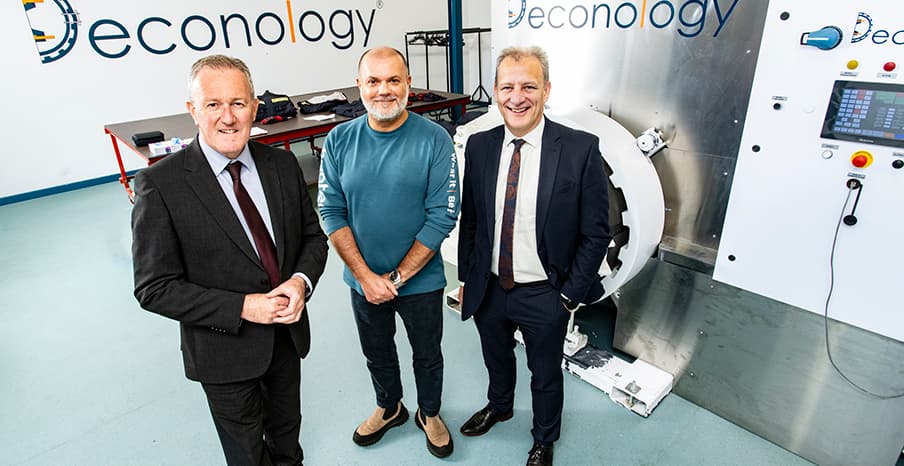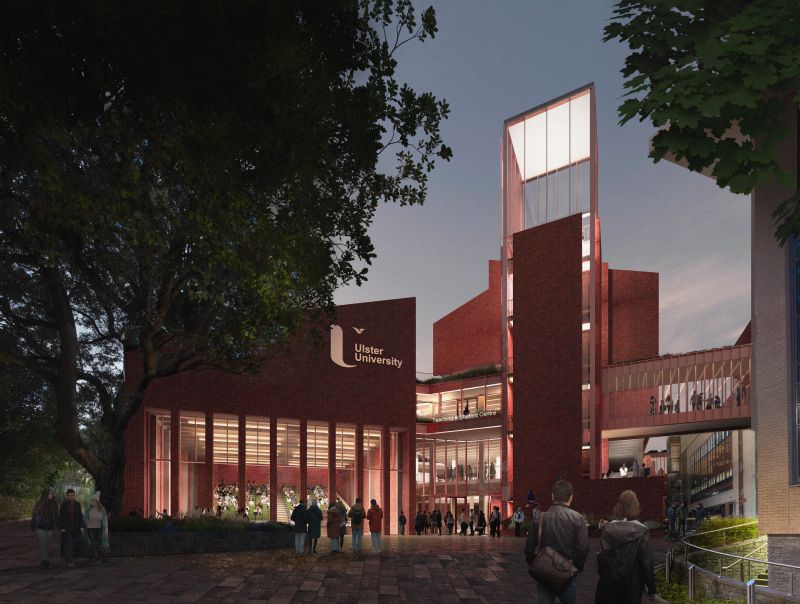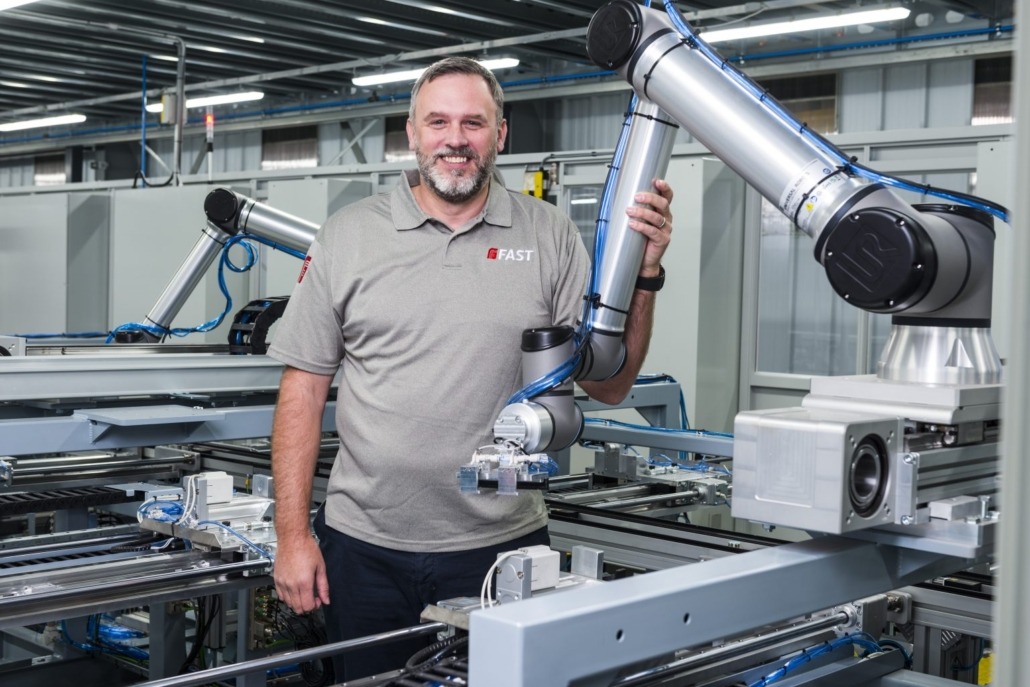
Londonderry/Derry based FAST Technologies has secured a multi-million-pound contract with the USA production site of Bloc Blinds.
The contract will see the integration of FAST’s advanced manufacturing technologies, incorporated into ‘Dreamaker’ at Bloc Blinds’ production facility in the US, transforming and streamlining the customisation and manufacturing of window blinds.
It will enable Bloc to dramatically scale up the production process and offer a 24-hour fulfilment time to customers across North America. The investment in FAST’s ground-breaking technologies reflects escalating demand for Bloc’s customised window blinds.
With a strong focus on intelligent manufacturing systems, FAST is at the forefront of revolutionising production processes across a wide range of sectors, through seamless implementation of automation technologies. By integrating advanced robotics, machine learning, and real-time data analytics, its ‘Dreamaker’ system enhances precision, reduces repetitive tasks, and maximises efficiency at every stage of production. This technology can empower workforces, enabling employees to focus on the more skilled and value-added tasks.
Speaking about the contract, Colin Spence, Technical Commercial Director from FAST, said:
“What sets FAST apart is our ability to push the boundaries of what is possible in industrial automation. Our solutions not only improve speed and scalability but also enables an end-to-end quality control, even across high-volume orders. This contract highlights FAST’s reputation for delivering advanced automation technologies that can adapt according to their customers’ needs.
“We believe this is a groundbreaking advancement in automation for the North American market and we are extremely proud to be part of this progressive partnership. FAST has over 25 years’ experience in industrial automation, allowing us to provide best in class automation solutions to industry leaders. As an advanced manufacturing company, our team have expertise specialising in automation, robotics and software solutions for companies worldwide.”
FAST is well-positioned to secure additional high-profile contracts and deliver on ambitious growth plans as its customer base has grown significantly in recent years, coinciding with the launch of their A2Hub, located in Catalyst Innovation Centre, Derry. This automation accelerator hub is an innovative space, whereby FAST can collaborate with companies on their digital transformation journey, developing and implementing custom solutions, unique to their business operations, which in turn supports sustainable business growth.
Cormac Diamond, Bloc Managing Director added: “Our facility is pioneering the production process, and this will be enhanced thanks to the innovative robotic systems and automated technologies delivered by the experts at FAST. We’re now best equipped to meet growing customer demand, drive efficiencies and manage issues such as labour shortage and spiralling energy costs which are common to all manufacturers today.”
Alchemy Technology Services, a leading software implementation and consultancy firm in the global insurance technology industry, has been announced as the first tenant of the new Ebrington Plaza building in Derry/Londonderry. This move is part of a multi-million pound investment in the North West region by Alchemy, signalling its ongoing commitment to the local economy.
The state-of-the-art, grade A office space in Ebrington Plaza will serve as Alchemy’s new permanent headquarters, supporting the company’s commitment to long term growth in the region. Founded in the city in 2018, Alchemy currently employs over 150 people in Derry/Londonderry, providing consultancy and software implementation services to the global insurance industry.
John Harkin, Founder and CEO of Alchemy Technology Services, expressed his enthusiasm for the move: “We are thrilled to be the first tenant in Ebrington Plaza. This new cutting-edge office space will allow us to continue our expansion and to create an exceptional work environment for our employees. The move supports our mission to create a centre of excellence for the transformation of the global insurance industry by attracting and retaining top talent in the North West. It reinforces Alchemy’s position both as a leading player in the global insurance industry and an employer of choice in Northern Ireland.
Harkin added, “Following the recent opening of our City of London office in the iconic Lloyd’s of London building, we’re confident our new headquarters will play a pivotal role in continuing to expand our customer base. It’s a testament to our development as a company over the past 6 years and to the hard work and dedication of our talent.”
Jeremy Fitch, Executive Director of Business Growth at Invest Northern Ireland said:“Invest NI has proudly supported Alchemy since it first established a presence in Northern Ireland in 2018, helping the company grow and create high-quality jobs.
“Today’s announcement reflects Alchemy’s confidence in the North West’s skilled talent pool. Companies like Alchemy play a vital role in strengthening our regional economy and reinforcing Northern Ireland’s reputation as a prime destination for business and investment.”
Paul Mulholland, Heron Group Property Director, commented ‘We are delighted to welcome Alchemy, a thriving local technology business, to Ebrington Plaza. Alchemy’s decision to choose Ebrington Plaza is testament to the quality of space on offer and the appeal of Ebrington as a business location. Alchemy has established itself as a leading player in its field and Heron Property are excited to deliver best-in-class office accommodation for their growing business.’
Mayor of Derry City and Strabane District Council, Councillor Lilian Seenoi -Barr, added
“Best wishes to all at Alchemy Technologies for this exciting new chapter in their journey.
“It represents another significant milestone for the firm who have expanded significantly since they were founded in 2018.
“Their decision to locate their headquarters in the heart of the city is a ringing endorsement of the North West as an attractive location to work, live and do business in.”
The move to Ebrington Plaza in spring 2025 marks a new chapter for Alchemy Technology Services as it continues to grow its presence in Northern Ireland and expand its services to the global insurance industry.
About Alchemy Technology Services
Alchemy Technology Services is a software implementation and consultancy firm driving the digitisation of the global insurance industry. Alchemy was founded in Derry/Londonderry in 2018 by John Harkin with a mission to create a centre of excellence that would offer world class careers for the talent of the North West. It currently employs 200 people in both Derry/Londonderry and in its London operation, Alchemy London Market, based in Lloyd’s of London.
About Ebrington Plaza
Ebrington Plaza is a new, multi-million pound development in Derry/Londonderry, offering grade A office space designed to attract and support businesses in the North West region of Northern Ireland. The development is set to play a crucial role in the area’s economic regeneration and growth.
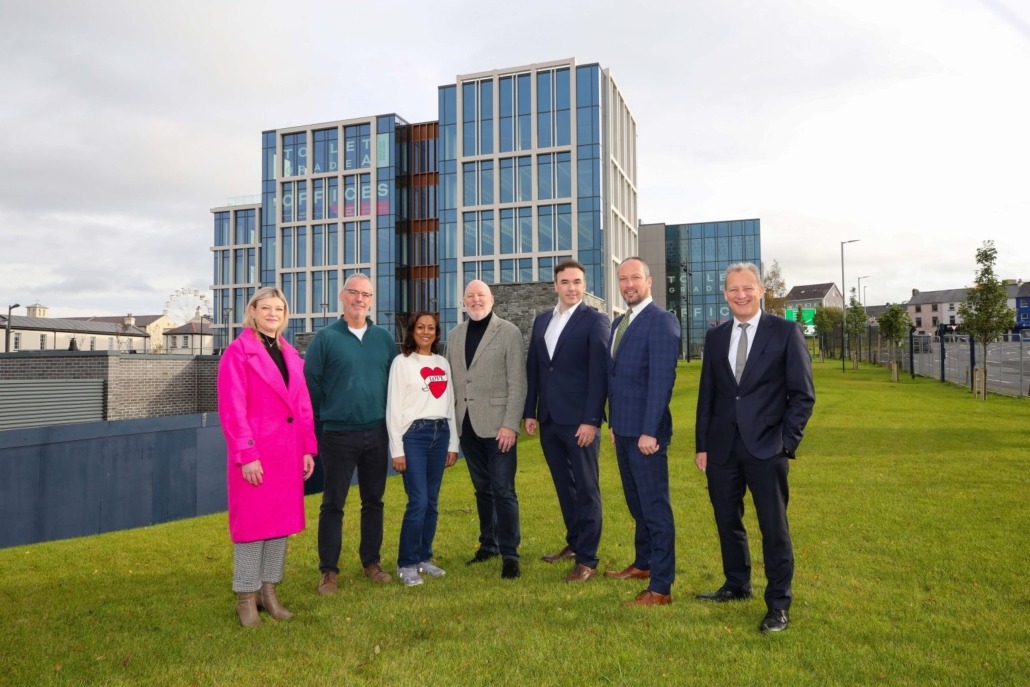
Economy Minister Conor Murphy has announced that Seating Matters is investing £3.7 million in its manufacturing facilities in Limavady and Derry as part of its ambitious expansion plan to triple turnover by 2027.
Seating Matters is a globally recognised leader in therapeutic seating design and manufacturing. The new investment will be made over the next two years and will lead to the creation of 62 new jobs, strengthening the company’s position as a key regional employer.
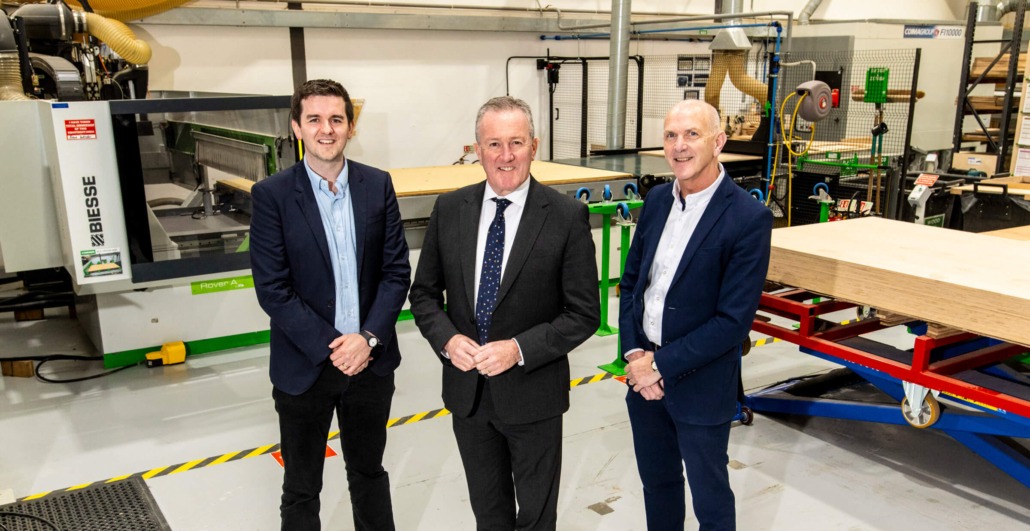
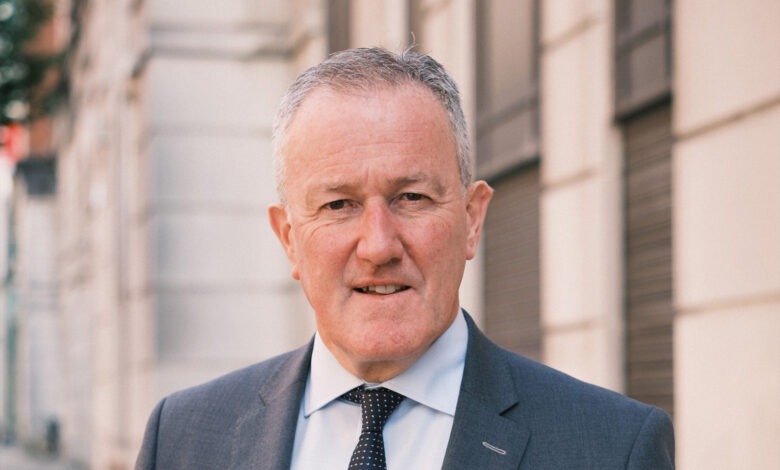
Making the announcement while visiting the company’s Limavady site Minister Murphy said: “A key priority in my Economic Plan is building a regionally balanced economy with high-quality jobs. I am delighted that these new roles in the North West will offer excellent employment opportunities for the local community.
“In recent years, Seating Matters has invested in advanced technologies to boost productivity which has contributed to its growth. This latest investment will further expand its capacity and enable it to produce even more products efficiently. I’m also pleased that Seating Matters is driven by continuous improvement in its drive for sustainability and efficiency.”
The new facility will be a manufacturing centre of excellence and will build upon the company’s current expertise in lean manufacturing.
Martin Tierney, Managing Director at Seating Matters said: “This investment supports our ambitious growth strategy to triple our turnover by 2027. With increased production capacity and over 60 new staff, we will be ready to scale rapidly and further ourselves as an award-winning exporter known for products which dramatically impact the lives of the most dependent patients in our society, and the people who care for them.”
“We are growing rapidly in global markets and set our sights on further export growth in Europe, North America and Australia. Our deep understanding of patients’ medical conditions, the caregivers needs in providing care and the latest clinical research will give us a competitive edge to do this.”
Welcoming the expansion, George McKinney, Invest NI’s Director of Technology, Services and Scaling said: “Since 2008, Invest NI has worked with Seating Matters to achieve ambitious growth targets. Today’s announcement is a testament to those efforts and will bring 62 new jobs to the North West, contributing to a regionally balanced economy.
“This investment will provide Seating Matters with the team, skills, and operational efficiencies needed to achieve its goal of tripling turnover by 2027. It also underscores Northern Ireland’s growing reputation as a centre of advanced engineering excellence.”
€77m (£65m) of PEACEPLUS funding has been awarded to transform six community facilities and public spaces in Northern Ireland and the border counties of Ireland.
Among the exciting and wide-ranging new cross-community initiatives to receive funding are the conversion of a former military barracks site into a sport, wellbeing and shared learning centre; the creation of a huge ‘Air Dome’ indoor arena in the North-West; and a significant investment at a North Belfast interface to enhance shared space and connectivity between local communities.
Six projects were successful in their bids for investment through PEACEPLUS, a programme managed by the Special EU Programmes Body (SEUPB).
Thousands of people are expected to benefit from the new facilities when completed and it is hoped they will bring people together, promote better understanding and trust, and provide communities with improved services and infrastructure.
The successful projects included within this round of PEACEPLUS funding are:
- The Centre of Participation Wellbeing & Shared Learning Hub (€15.4m) – a 30-acre complex based at the former military barracks site owned by the UK Ministry of Defence in Ballykinlar, Co Down. Led by Down Gaelic Athletic Association in partnership with County Down Rural Community Network and Co-Operation Ireland, the project will see the construction of a new two-storey complex building to include a heritage and shared learning space, and a new 2,000-square-metre multi-purpose games arena (MUGA)
- UU Dome (€10.86m) – Led by Ulster University, this project will transform the old Foyle College site in the city of Derry-Londonderry into a regionally significant and inclusive shared space that will generate significant, meaningful and purposeful contact between different communities. The site, which is currently vacant and disused, will see the development of an ‘Air Dome’ facility comprising of a 15,000 square metre year-round indoor arena with synthetic playing field and capacity for thousands of spectators.
- Reconnected Belfast (€13.5m) – Focused on the Waterworks and Alexandra Park in North Belfast, the project will see further progress towards the removal of peace walls and enhancement of green space for use by local residents, community organisations and schools. Led by Belfast City Council in partnership with the Department of Justice, Reconnected Belfast is part of a strategic connectivity project which aims to make Belfast a fully sustainably connected city via a series of greenways, urban greenways, and pocket parks.
- The Riverine 2023 (€16.7m) shared space – spanning both Lifford in Co Donegal and Strabane in Co Tyrone, the project will include the creation of 30 acres of parklands and a new community pavilion building, developed through a cross-border partnership between Donegal County Council and Derry City and Strabane District Council.
- The Ballycastle Shared Space Project (€5.2m), which will see the enhancement of sports facilities on the grounds of the planned Shared Education Campus (SEC) in the town, providing community access and shared usage between the school and the local community for sport, leisure and recreation purposes. The project will be led by Causeway Coast and Glens Borough Council in partnership with the Department for Education.
- The Shannonside Peace Arena (€15.3m) in Carrick-on-Shannon. Led by Leitrim County Council in partnership with Shannonside Regional Recreational Campus, the project will create a new inclusive shared space with a co-designed, sustainable building which facilitate meaningful and purposeful contact between different communities. The development will include a double-height multi-use sports hall and high-performance gym.
All six projects are to be funded under the Special EU Programme Body’s Re-Imaging Communities investment area, which is part of the €1.14bn PEACEPLUS programme.
Communities Minister Gordon Lyons MLA said: “I am delighted that the PEACEPLUS Steering Committee has approved funding for six projects under the Re-Imaging Communities Investment Area of the PEACEPLUS Programme.
“It is my ambition to deliver policies and programmes that will have real and meaningful impact, that are sustainable and that will provide tangible, lasting benefits.
“My department has previously supported 25 capital builds under the Shared Spaces element of the PEACE III and PEACE IV Programmes which were delivered in partnership with the Special European Union Programmes Body. These projects have clearly demonstrated the many positive impacts such investments can have across society. I am therefore pleased that we are able to build on this success by supporting these new shared spaces.
“I want to congratulate each of the projects on their achievement in securing funding for their proposals.”
Minister for Rural and Community Development Heather Humphreys TD said: “We have witnessed the benefits from the development of these shared spaces under the various PEACE programmes, which have brought about real change through the repurposing of lands, the reimaging of existing buildings and spaces, creating new parks and infrastructure and regenerating peace line interface barriers.
“These shared spaces, which are stunning to look at, have a huge transformational impact and support economic and tourism opportunities in the region, while also ensuring the bringing together of all communities into a safe neutral space and I am sure this programme will be no different.
“I want to commend all the applicants for the time and effort that went into drafting the applications received under this funding call, which was hugely over-subscribed.
“I wish all the success applicants the very best of luck in getting their projects underway for the benefit of all in their communities and surrounding hinterlands. I am delighted that my Department of Rural and Community Development will be partnering with the Department for Communities in Northern Ireland and the Special EU Programmes Body in providing funding for these wonderful projects.”
SEUPB Chief Executive Gina McIntyre said: “There was a huge response to this funding call which really demonstrated the public’s appetite and need for shared spaces within our communities. We have seen from previous PEACE programmes how shared civic spaces can act as beacons of hope within a community, real catalysts for change and enhanced socio-economic environments.
“I am delighted that through PEACEPLUS we will be delivering another six transformed and repurposed facilities for people right across Northern Ireland and the border counties of Ireland.
“These new facilities will provide places where people can come together, collaborate and engage with one another in a safe, inclusive and welcoming environment. They are crucial for peacebuilding and reconciliation.
“Their impact transcends the bricks and mortar required for their construction, penetrating much further into the local community through the changes in both attitudes and behaviours, resulting in a reduction in segregation and contributing to sustained peace and prosperity.”
Unfortunately, given the scale of interest in the investment area, a number of excellent applications were unsuccessful in attaining funding through the Re-Imaging Communities investment area.
The SEUPB said while it recognised this would be disappointing for those impacted, there was a finite budget and those successful must deliver the maximum impact for the community and ensure the provision of the very best services and facilities. This competitive process meant that all applications were rigorously assessed to ensure full compliance with all criteria for public monies.
PEACEPLUS is co-funded by the European Union, the Government of the United Kingdom of Great Britain and Northern Ireland, the Government of Ireland, and the Northern Ireland Executive.
Economy Minister Conor Murphy has launched the Future Medicines Institute (FMI), a £55million industry-led collaborative initiative aimed at advancing the North’s Precision Medicine sector.
Backed by a consortium of leading companies in Precision Medicine and supported by leading academics from Queen’s University Belfast and Ulster University, FMI will drive innovation and productivity in Precision Medicine, building on Northern Ireland’s strong reputation in diagnostics and therapeutics.
Minister Murphy said: “This £55 million investment in the Future Medicines Institute is a landmark step for Precision Medicine in the North which will strengthen our Life and Health Sciences sector and reinforce the region’s role in global healthcare innovation.
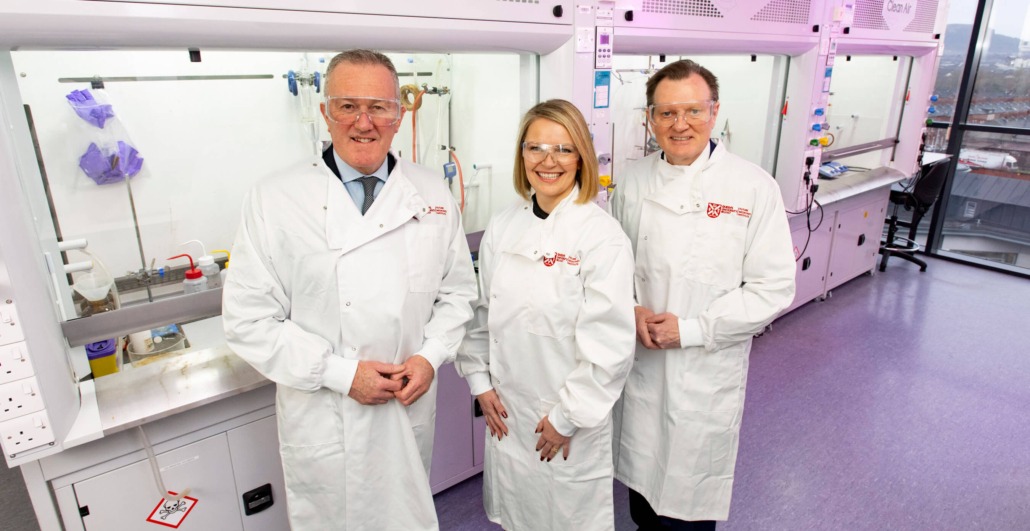

“FMI will foster collaboration across industry, academia, and healthcare to accelerate the development of new drugs and diagnostics, driving growth in our economy. It will provide a vital pathway to speed up patient access to personalised treatments, streamline drug development processes, and bring innovative solutions to market at pace.”
The industry consortium has been offered £35m from the Northern Ireland Executive towards FMI, with the consortium members contributing an additional £20m. This will fund a wide range of collaborative R&D activities between the companies and universities. It will also create a shared lab within Queen’s University Belfast, where industry and academics can come together to collaborate and access leading edge technologies.
Professor Ian Greer, Vice-Chancellor of Queen’s University Belfast, said: “Queen’s is proud to be hosting this initiative, working in partnership with industry experts and Ulster University to advance novel therapeutics and diagnostics. The FMI will stimulate the creation of a cluster for innovation, talent development, and global partnerships within Northern Ireland’s Life and Health Sciences sector.”
The industry consortium is made up of Diaceutics PLC, Fusion Antibodies PLC, Randox Laboratories Ltd, Almac Group, Sonrai Analytics, Exploristics and ProAxsis. Ryan Keeling, CEO of Diaceutics PLC said: “The Future Medicines Institute represents a pivotal step forward for Precision Medicine. At Diaceutics, this collaboration provides an opportunity to harness data-driven insights and cutting-edge technology to improve outcomes across the healthcare sector. By joining forces with other local companies through FMI, we’re reinforcing Northern Ireland’s role as a leader in Precision Medicine.”
The FMI will also focus on skills development, leveraging the local universities and colleges to address talent gaps in the sector, foster spinouts, and drive job creation, supporting the broader Northern Ireland economy.
UK Research & Innovation (UKRI) will manage the delivery of the projects within FMI. Dame Jessica Corner, UKRI SRO for Place and Chair of SIPF, said “We are delighted to welcome the Future Medicines Institute to the Strength in Places Fund programme. Funding from the Northen Ireland Executive for the Institute has enabled a very strong project from the initial competition to join the other UKRI Strength in Places Projects and demonstrates how highly the programme is regarded.
“We look forward to supporting the Future Medicines Institute to benefit very quickly from all the experiences and insights we have gained from the programme and all the other projects to deliver real benefits for the Northern Ireland economy and widely for society.”
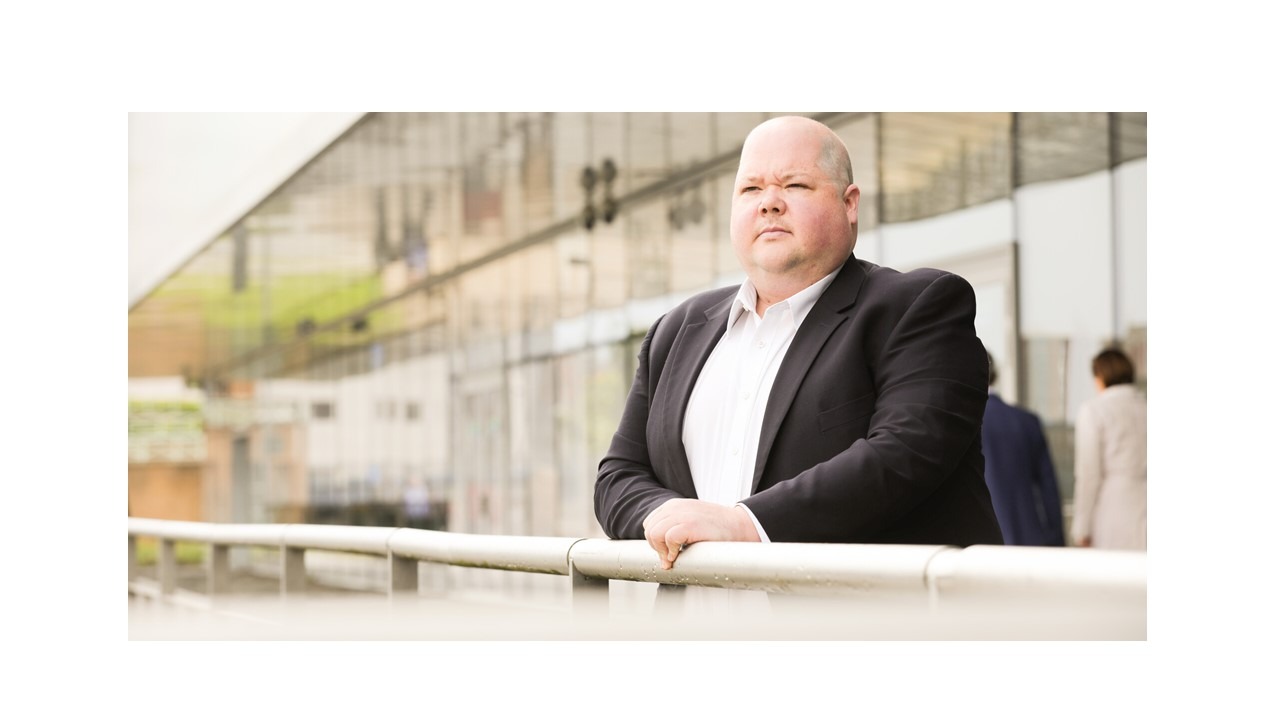
The Derry-Londonderry and Strabane City Region City Deal has celebrated a major milestone with the signing of a Financial Deal to unlock more than £290 million of investment in health, life science and digital projects and bring transformational change to the region.

Derry City and Strabane District Council Chief Executive John Kelpie explains the key benefits of the City Deal, and what it could mean to people hoping to return to the North West.
Congratulations on the signing of the Financial Deal. How will the City Deal change people’s day-to-day lives in the Derry City and Strabane region?
The Derry City and Strabane City Deal will improve people’s quality of life by creating more job opportunities, a safer, more vibrant city and town centre, and a focus on education and skills. It has the potential to bring up to 6,300 jobs by 2033 and lever additional millions in investment over the next decade. We aim to increase our output growth with a GVA (gross value added) of £230m per annum, which should see a significant rise in wages. People can expect to see real growth in sectors such as health and life sciences, digital industries and SMART technology that will support economic investment and regeneration, and also boost tourism and culture.
As someone who has been working on the City Deal since its inception, what aspect of the deal are you most proud of?
This is a once in a generation deal; its impact will be felt by the people of the city and district for many years to come. Personally, I’m proud of the collaboration between all the key partners who worked tirelessly to get it across the line. It’s been a joined-up approach which has seen us harness collective resources, expertise and passion for the North West. The investment from the UK government and NI Executive, plus the input from all the delivery partners, allows us to leverage additional private sector investment and make a real, positive difference to local people’s lives.
What type of jobs will be created?
We anticipate jobs will be created across all City Deal projects – including Smart Cities and digital enabling infrastructure, the School of Medicine and C-TRIC expansion, Strabane town centre’s regeneration, the Derry riverfront regeneration, Walled City tourism and the DNA (Derry North Atlantic) Museum in Ebrington.
Sustainability, inclusivity and employability are crucial and partners are already working to create a skills pipeline for the employment opportunities created by the City Deal – helping people upskill, reskill and boost digital skills.
The investment will also boost confidence and stimulate additional private sector activity and jobs. We anticipate an overall increase of 12% in the labour market, with large increases in areas such as healthcare and tourism.
What benefits will the City Deal bring for potential investors?
The North West is already an attractive proposition for investors, thanks to our unique cross-border location, our talented, well-educated workforce, and our fantastic quality of life. The City Deal, with its emphasis on innovation, digital infrastructure and regeneration will transform our local economy, and make the city and district an even greater place to do business.
What are the next steps for the City Deal?
The official signing of the Financial Deal means Council and its delivery partners can now access funding to progress to the next stage of delivering the projects, once the full business cases are approved. The next phase of the City Deal will focus on detailed design and delivery. This work will include a wider awareness and engagement process, as the designs are developed.
What message would you have for anyone looking to return or relocate to the North West?
If you grew up here, or are considering a move here, you’ll already know that there’s nowhere quite like the North West. Our location, the friendliness of our people and our rich cultural heritage are second to none. There’s an energy and excitement here, and economic growth in recent years means we are already seeing diaspora return to live, work and raise their families. The City Deal will supercharge that prosperity, innovation and regeneration. There’s never been a better time to come home. I would encourage anyone considering relocation to visit investderrystrabane.com and sign up to the Derry Strabane Global newsletter for job and investment updates, and help planning their move.
When will City Deal projects be visible on the ground?
The pledge by the UK and NI Governments with the signing of the Financial Deal allows us to progress to the delivery phase of the projects, which will be on a phased approach over the next 10 years. The first visible project will be the DNA Museum being on site by early 2025 and the Museum opening in late 2026. All of the projects are at different stages of delivery, and these will be implemented in phases. With the financial deal in place, we will now be moving at pace to bring the other projects such as the Strabane Strategic Leisure project, a key element of the Strabane Regeneration, to the next stage of delivery. There will also be a focus on creating designs and drawings ahead of engagement with the public and partners.
What legacy do you hope the City Deal will leave for future generations?
With its focus on sustainable growth and lasting change, the positive impacts of the City Deal will be felt for generations to come – from health and wellbeing, to job prospects and economic prosperity. It’s about fulfilling Derry City and Strabane’s potential as a thriving, prosperous and inclusive region for all its inhabitants.
Where can the public find out more and be kept informed about progress?
People can visit www.derrystrabane.com/citydeal and keep an eye on Derry City and Strabane District Council’s social media channel for updates.

Over 6,000 new jobs could be created thanks to City Deal and Inclusive Future Fund
UK Government and NI Executive Ministers gathered at The Guildhall in Derry today to sign the Financial Deal for the Derry-Londonderry and Strabane City Region City Deal that will unlock in excess of £290m of investment in health, life science and digital projects, and help bring about transformational changes and benefits to the region.
The UK Government has provided £50m City Deal funding and £55m via the Inclusive Future Fund, which has been match funded by the Northern Ireland Executive with contributions by Derry City and Strabane District Council and its project partners of £83m.
The funding marks the single largest investment by the UK Government and NI Executive in this region, and today’s signing of the Financial Deal represents a significant step forward in the City Deal journey. This will ultimately enable progress and the successful delivery of key infrastructure, regeneration and tourism projects.
The Derry~Londonderry and Strabane City Region City Deal and Inclusive Future Fund will see more than £250m invested in the city and district with a focus on innovation, digital and health projects together with regeneration, tourism and renewal initiatives, creating up to 6,300 new jobs by 2033 and allowing the region to attract investment, enable regeneration and boost tourism.
The Derry~ Londonderry and Strabane City Region City Deal partners – Derry City and Strabane District Council, Ulster University, the North West Regional College, the Western Health and Social Care Trust and Clinical Translational Research Centre (C-TRIC Ltd) – have been working intensively with the NI Executive, UK Government and industry partners and are hugely proud of the success of this collaboration in reaching this landmark stage of the process following the signing of the Heads of Terms in 2021.
Today’s official signing of the Financial Deal sets in motion the next stages of the process for Council and its delivery partners to work to deliver the projects, once the full business cases are approved. The focus for the next phase of the City Deal is the detailed design and delivery. The signing of the financial deal will allow access to funding to undertake this work which will include a wider awareness and engagement process as the detailed designs are developed.
Among the attendees at today’s event were the First Minister, Michelle O’Neill; deputy First Minister Emma Little-Pengelly, MLA; the Secretary of State for NI, Hilary Benn MP and the Finance Minister Dr Caoimhe Archibald. There were messages of support from the Minister of Health, the Minister for Infrastructure, the Minister for Economy and the Communities Minister, acknowledging the significance of the event.
The Mayor of Derry City and Strabane District Council Cllr Lilian Seenoi Barr, who hosted the event, acknowledged the importance of the investment.
She said: “This is a momentous day for the Derry and Strabane region. Thanks to cross-party political support, private sector backing and unprecedented levels of collaboration from all the partners, we’ve succeeded in securing this significant, long-term commitment to transforming the NI economy in the sectors where we have the potential to become world leaders.
“This City Deal provides us with an opportunity to be vibrant and exciting, and to provide us with so much potential for growth and prosperity. Today, with the signing of the Financial Deal Agreement, we have reached a major milestone, unlocking £290m of capital investment from the UK Government, the Northern Ireland Executive and our local delivery partners.”
Secretary of State for Northern Ireland Hilary Benn said: “I am delighted that the Derry-Londonderry and Strabane City Region City Dealis proceeding as planned, and proud to sign the deal on behalf of the UK Government.
“It’s going to provide support to so many important initiatives which will positively impact the lives of local people, including the regeneration of the waterfront in Derry, and of Strabane town centre.
“The digital and innovation projects which the UK Government is investing in through this deal will deliver a fantastic economic boost and opportunities for residents of the entire North West region. Exciting projects such as the £39 million new combined Cognitive Analytics and Digital Robotics Centre (CADRC), will deliver cutting-edge research and innovation. A new School of Medicine/ Personalised Medicine Centre will develop research capabilities at Ulster University’s Magee Campus, complemented by educational facilities at Altnagelvin Hospital campus.
“I congratulate everyone involved for their hard work and dedication over many years to reach this important milestone. I look forward to seeing the positive impact this investment will have on local people and businesses.”
John Kelpie, Chief Executive of Derry City and Strabane District Council, on behalf of the delivery partners said: “This once in a generation City Deal would not have been possible without the successful collaboration between all of the partners involved who have worked tirelessly to get it over the line. This joined up approach has seen us using our resources, expertise and determination to secure this funding for our area so that we can make a real and positive difference to the lives of people who live and work here. The significant investment from the UK government and NI Executive with additional input from all the delivery partners allows us to leverage additional private sector investment to deliver a programme with an overall value well currently standing at £290m.”
The Mayor added that the City Deal will strengthen the region’s offer in growth sectors such as life and health sciences, digital and creative industries and will also support next generation digital capabilities, boost tourism by creating world-class visitor experiences and enable regeneration, underpinned by infrastructure developments and investment in skills to connect people to jobs and services.

Economy Minister Conor Murphy has announced that Derry based professional clothing company Hunter Apparel Solutions has won a £3.5million contract with Dublin Fire Brigade.
The contract follows a £1million investment in new machinery by Hunter which is enabling it to offer a revolutionary PPE decontamination service.
During a visit to the company, Minister Murphy said: “Hunter has embraced technology and innovation to develop from its origins as an apparel manufacturer to become a leader in the design, supply and maintenance of technical professional clothing.
“This contract with Dublin Fire Brigade highlights the opportunities that exist in the all-island economy. As a result of its investment and subsequent contract success, Hunter has created three new jobs in Derry. Its new decontamination service is also helping to safeguard the health of key workers as well as reducing wastage by maximising the lifespan of uniforms. All of this is in keeping with my vision of creating a regionally balanced and sustainable economy.”
My department and Invest NI will be working closely with businesses to ensure they understand the unique dual market access opportunities and the regulatory environment, so they are well placed to take advantage of our export growth potential.
Conor Murphy, Minister for the Economy
The Minister added: “Trading with the south can be a catalyst for businesses to grow into new export markets. My department and Invest NI will be working closely with businesses to ensure they understand the unique dual market access opportunities and the regulatory environment, so they are well placed to take advantage of our export growth potential.”
With Invest NI support, Hunter Apparel Solutions purchased new decontamination machinery which uses liquid carbon dioxide (LC02+) to eradicate contaminants and carcinogens from fire service clothing. The contract with Dublin Fire Brigade involves fully neutralizing the toxins in the protective clothing of its firefighters, ensuring that harmful substances do not build up in the garments leading to serious ill health.
Located in Springtown Industrial Estate, Hunter Apparel Solutions employs 53 staff. It was founded in 1936 and is now managed by the third generation of the Hunter family. The company supplies its garments and services across key market segments – blue light and security; rail and other transport utilities; and specialist PPE and workwear.
CEO, Simon Hunter, said: “Hunter is the technology leader in the professional clothing sector. We were first to market with a specialised digital service, along with a platform for tracking and tracing personal protective equipment to ensure safety protocols are followed. We have also launched an artificial intelligence-based sizing tool and introduced robotics to our R&D centre and warehousing.
Invest NI has worked with Hunter over many years providing both financial and advisory support and we will continue to be a trusted partner as it enters its next phase of growth.
Jeremy Fitch, Executive Director of Business Solutions, Invest NI
“Our new LC02+ decontamination service is the next step in providing our clients with a 21st-century professional clothing service. It removes 99% of carcinogens from firefighters’ PPE and prolongs the lifespan of the clothing in a single wash environmentally friendly process. On the back of this continuous research and development and our passion for innovation, we anticipate that our turnover will continue to grow well into the future.”
Congratulating the company on its new contract, Jeremy Fitch, Executive Director of Business Solutions at Invest NI, said: “Hunter continues to invest in its future, ensuring it maintains its competitive position as a technological leader in its field. The company’s LC02+ system investment has been rewarded with this significant four-year contract with Dublin Fire Brigade adding to many other export successes.
“Invest NI has worked with Hunter over many years providing both financial and advisory support and we will continue to be a trusted partner as it enters its next phase of growth.”
Economy Minister Conor Murphy has announced that Derry based professional clothing company Hunter Apparel Solutions has won a £3.5million contract with Dublin Fire Brigade.
The contract follows a £1million investment in new machinery by Hunter which is enabling it to offer a revolutionary PPE decontamination service.
During a visit to the company, Minister Murphy said: “Hunter has embraced technology and innovation to develop from its origins as an apparel manufacturer to become a leader in the design, supply and maintenance of technical professional clothing.
“This contract with Dublin Fire Brigade highlights the opportunities that exist in the all-island economy. As a result of its investment and subsequent contract success, Hunter has created three new jobs in Derry. Its new decontamination service is also helping to safeguard the health of key workers as well as reducing wastage by maximising the lifespan of uniforms. All of this is in keeping with my vision of creating a regionally balanced and sustainable economy.”
The Minister added: “Trading with the south can be a catalyst for businesses to grow into new export markets. My department and Invest NI will be working closely with businesses to ensure they understand the unique dual market access opportunities and the regulatory environment, so they are well placed to take advantage of our export growth potential.”
With Invest NI support, Hunter Apparel Solutions purchased new decontamination machinery which uses liquid carbon dioxide (LC02+) to eradicate contaminants and carcinogens from fire service clothing. The contract with Dublin Fire Brigade involves fully neutralizing the toxins in the protective clothing of its firefighters, ensuring that harmful substances do not build up in the garments leading to serious ill health.
Located in Springtown Industrial Estate, Hunter Apparel Solutions employs 53 staff. It was founded in 1936 and is now managed by the third generation of the Hunter family. The company supplies its garments and services across key market segments – blue light and security; rail and other transport utilities; and specialist PPE and workwear.
CEO, Simon Hunter, said: “Hunter is the technology leader in the professional clothing sector. We were first to market with a specialised digital service, along with a platform for tracking and tracing personal protective equipment to ensure safety protocols are followed. We have also launched an artificial intelligence-based sizing tool and introduced robotics to our R&D centre and warehousing.
“Our new LC02+ decontamination service is the next step in providing our clients with a 21st-century professional clothing service. It removes 99% of carcinogens from firefighters’ PPE and prolongs the lifespan of the clothing in a single wash environmentally friendly process. On the back of this continuous research and development and our passion for innovation, we anticipate that our turnover will continue to grow well into the future.”
Congratulating the company on its new contract, Jeremy Fitch, Executive Director of Business Solutions at Invest NI, said: “Hunter continues to invest in its future, ensuring it maintains its competitive position as a technological leader in its field. The company’s LC02+ system investment has been rewarded with this significant four-year contract with Dublin Fire Brigade adding to many other export successes.
“Invest NI has worked with Hunter over many years providing both financial and advisory support and we will continue to be a trusted partner as it enters its next phase of growth.”
